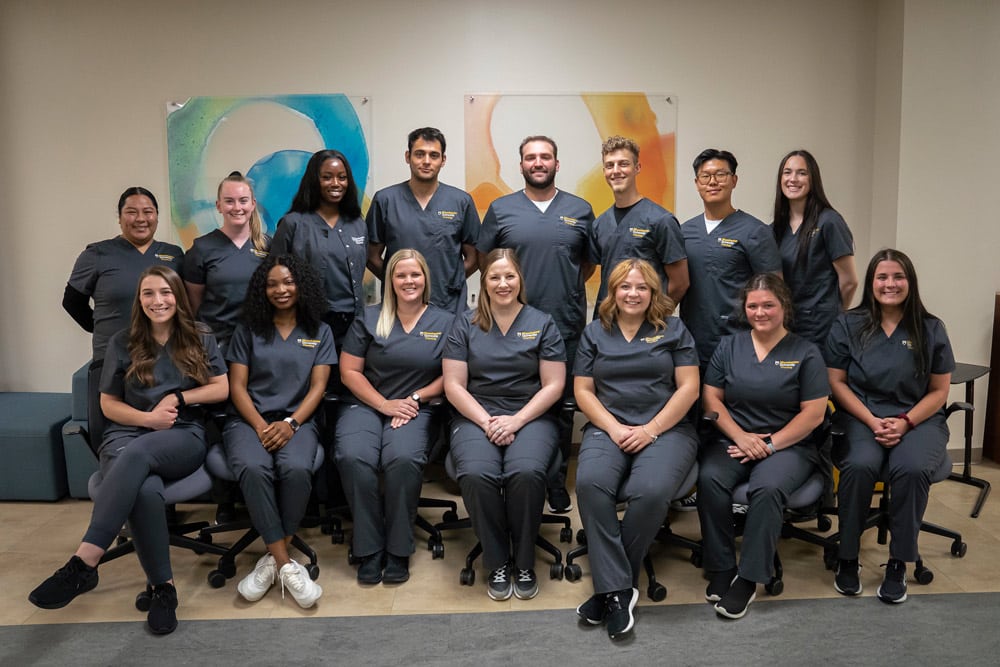Accreditation Requirements for ABSN
This page provides accrediting bodies and reviewers with an overview of Manchester University’s Accelerated Bachelor of Science in Nursing (ABSN) program. It includes the program’s philosophy, mission, conceptual framework, and defined learning outcomes. The content reflects the program’s alignment with the University’s liberal arts foundation, commitment to academic excellence, and adherence to professional standards in nursing education and practice.
Program Philosophy
Nursing Handbook
Mission
The mission of the nursing program is to prepare future nurses to respect the infinite worth of every individual and to practice nursing by drawing on their faith to lead principled, productive, and compassionate lives that inspire them to be servant leaders within the nursing profession.
Conceptual Model
The four concepts that comprise the conceptual framework of the Manchester University Nursing Program include individual/community, environment, health, and nursing. Each component is defined as follows:
Individual/Community
The individual is recognized as having inherent dignity, value, and purpose. Individuals self-actualize through the integration of relationships and functioning within families, groups, and communities. The community promotes positive self-identity, empowering individuals to evolve as healthy in mind, body, and spirit.
Environment
The environment encompasses constantly changing internal and external determinants that affect the individual’s physical, psychological, and spiritual elements (internal) and (external) variables, including cultural, social, biophysical, political, and economic. Nursing can serve as a resource to influence health promotion and maintenance within the environment.
Health
Health represents a dynamic and holistic phenomenon, balancing the individual and the environment. An individual’s health exists on a continuum from optimal wellness to illness, disease, dysfunction, and changes occurring throughout their life span, including their end-of-life.
Nursing
Nursing is an interactive, interpersonal approach to assist individuals in achieving optimal health and wellness through compassionate, nurturing, evidence-based, holistic nursing care. Nursing education expounds upon the humanities, sciences, and liberal education courses, which are necessary to appreciate the holistic nature of the individual. Nursing faculty believe that excellence in nursing education fosters a diverse and inclusive learning environment that stimulates the spirit of inquiry and lifelong learning. Respect for multiple perspectives guides students and faculty to provide effective intercultural care, contribute to local and global efforts to eliminate health disparities and advocate for vulnerable populations.

Program Outcomes
-
Demonstrate an understanding of the discipline of nursing’s distinct perspective and where shared perspectives exist with other disciplines, apply theory and research-based knowledge from nursing, the arts, humanities, and other sciences, and demonstrate clinical judgment founded on a broad knowledge base. (Knowledge for Nursing Practice)
-
Engage with the Individual in establishing a caring relationship, communicate effectively with individuals, integrate assessment skills in practice, diagnose actual or potential health problems and needs, develop a plan of care, demonstrate accountability for care delivery, evaluate outcomes of care, promote self-care management, and provide care coordination. (Person-Centered Care)
-
Manage population health, engage in effective partnerships, consider the socioeconomic impact of health care delivery, advance equitable population health policy, demonstrate advocacy strategies, and advance preparedness to protect population health during disasters and public health emergencies. (Population Health)
-
Advance the scholarship of nursing, integrate the best evidence into nursing practice, and promote the ethical conduct of scholarly activities. (Scholarship for the Nursing Discipline)
-
Apply quality improvement principles in care delivery, contribute to a culture of patient safety, and contribute to a culture of provider and work environment safety. (Quality and Safety)
-
Communicate in a manner that facilitates a partnership approach to principles and values of team dynamics, use knowledge of nursing and other professions to address healthcare needs, and work with other professions to maintain a climate of mutual learning, respect, and shared values. (Interprofessional Partnerships)
-
Apply knowledge of systems to work effectively across the continuum of care, incorporate consideration of cost-effectiveness of care, and optimize system effectiveness by applying innovation and evidence-based practice. (Systems-Based Practice)
-
Describe the various information and communication technology tools used in the care of patients, communities, and populations; use information and communication technology to gather data, create information, and generate knowledge; use information and communication technologies and informatics processes to deliver safe nursing care to diverse populations in a variety of settings; use information and communication technology to support documentation of care and communication among providers, patients, and all system levels; and use information and communication technologies in accordance with ethical, legal, professional, and regulatory standards, and workplace policies in the delivery of care. (Informatics and Healthcare Technologies)
-
Demonstrate an ethical comportment in one’s practice reflective of nursing’s mission to society, employ a participatory approach to nursing care, demonstrate accountability to the individual, society, and the profession, comply with relevant laws, policies, and regulations, demonstrate the professional identity of nursing, and integrate diversity, equity, and inclusion as core to one’s professional identity. (Professionalism)
-
Demonstrate a commitment to personal health and well-being and demonstrate a spirit of leadership. (Personal, Professional, and Leadership Development)
Meet the Faculty
Non-Discrimination in the Admission Process
Manchester University is committed to non-discrimination in campus life. The University does not discriminate on the basis of national origin, ancestry, race, color, age, sex, gender identity or expression, sexual orientation, familial status, religion, disability or veteran status in admissions or any area of campus life, including its educational programs, scholarships and loan awards, residence life programs, athletic programs, extracurricular programs, promotion and tenure policies and practice, and alumni affairs.
Manchester University is committed to carry out the provisions of Section 504 of the Rehabilitation Act of 1973 and the Americans With Disabilities Act, which provide for accessibility of University programs to the physically disabled.










